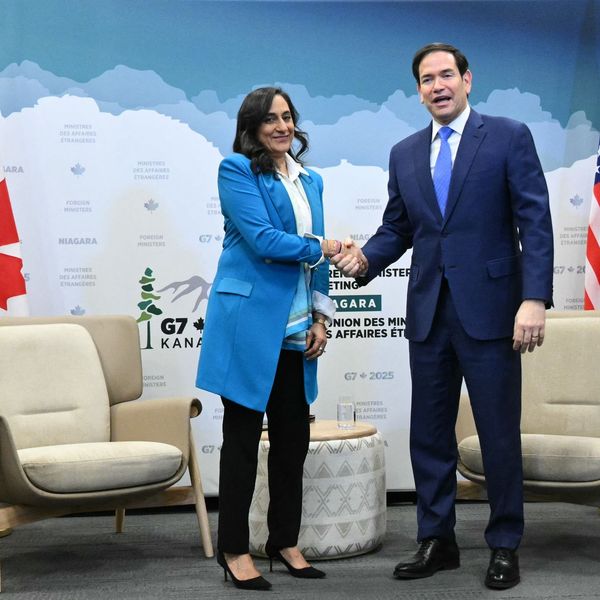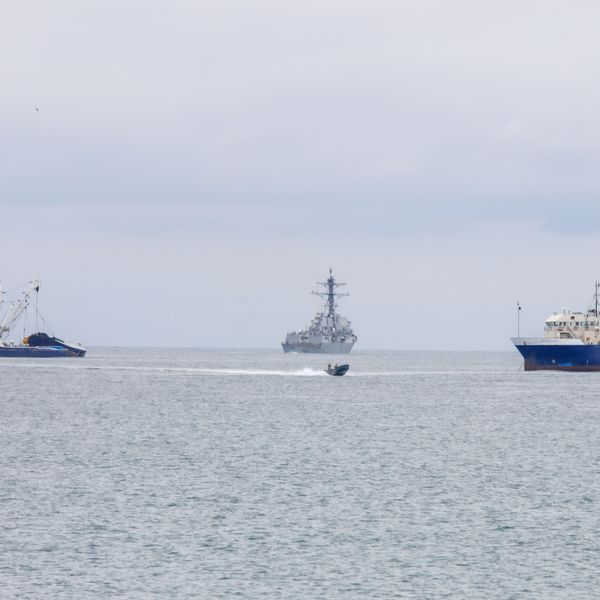In the Same Week, the US and UK Hide Their War Crimes by Invoking "National Security"
Colonel Ian Henderson was a British official dubbed "the Butcher of Bahrain" because of atrocities he repeatedly committed during the 30 years he served as chief security official of that Middle Eastern country. His reign of terror began when Bahrain was a British "protectorate" and continued when the post-"independence" Bahraini King retained him in the same position.
Colonel Ian Henderson was a British official dubbed "the Butcher of Bahrain" because of atrocities he repeatedly committed during the 30 years he served as chief security official of that Middle Eastern country. His reign of terror began when Bahrain was a British "protectorate" and continued when the post-"independence" Bahraini King retained him in the same position. In 1996, the Independent described him as "the most feared of all secret policemen" in Bahrain, and cited "consistent and compelling evidence that severe beatings and even sexual assaults have been carried out against prisoners under Henderson's responsibility for well over a decade."
A 2002 Guardian article reported that "during this time his men allegedly detained and tortured thousands of anti-government activists"; his official acts "included the ransacking of villages, sadistic sexual abuse and using power drills to maim prisoners"; and "on many occasions they are said to have detained children without informing their parents, only to return them months later in body bags." Needless to say, Col. Henderson was never punished in any way: "although Scotland Yard launched an inquiry into the allegations in 2000, the investigation was dropped the following year." He was showered with high honors from the UK-supported tyrants who ran Bahrain.
Prior to the massacres and rapes over which he presided in Bahrain, Henderson played a leading role in brutally suppressing the Mau Mau insurgency in another British colony, Kenya. In the wake of his Kenya atrocities, he twice won the George Medal, "the 2nd highest, to the George Cross, gallantry medal that a civilian can win." His brutality against Kenyan insurgents fighting for independence is what led the U.K. Government to put him in charge of internal security in Bahrain.
For years, human rights groups have fought to obtain old documents, particularly a 37-year-old diplomatic cable, relating to British responsibility for Henderson's brutality in Bahrain. Ordinarily, documents more than 30 years old are disclosable, but the British Government has fought every step of the way to conceal this cable.
But now, a governmental tribunal ruled largely in favor of the government and held that most of the diplomatic cable shall remain suppressed. The tribunal's ruling was at least partially based on "secret evidence for the Foreign and Commonwealth Office (FCO) from a senior diplomat, Edward Oakden, who argued that Britain's defence interests in Bahrain were of paramount importance"; specifically, "Mr Oakden implied that the release of such information could jeopardise Britain's new military base in the country."
Read the full article at The Intercept.
An Urgent Message From Our Co-Founder
Dear Common Dreams reader, The U.S. is on a fast track to authoritarianism like nothing I've ever seen. Meanwhile, corporate news outlets are utterly capitulating to Trump, twisting their coverage to avoid drawing his ire while lining up to stuff cash in his pockets. That's why I believe that Common Dreams is doing the best and most consequential reporting that we've ever done. Our small but mighty team is a progressive reporting powerhouse, covering the news every day that the corporate media never will. Our mission has always been simple: To inform. To inspire. And to ignite change for the common good. Now here's the key piece that I want all our readers to understand: None of this would be possible without your financial support. That's not just some fundraising cliche. It's the absolute and literal truth. We don't accept corporate advertising and never will. We don't have a paywall because we don't think people should be blocked from critical news based on their ability to pay. Everything we do is funded by the donations of readers like you. Will you donate now to help power the nonprofit, independent reporting of Common Dreams? Thank you for being a vital member of our community. Together, we can keep independent journalism alive when it’s needed most. - Craig Brown, Co-founder |
Colonel Ian Henderson was a British official dubbed "the Butcher of Bahrain" because of atrocities he repeatedly committed during the 30 years he served as chief security official of that Middle Eastern country. His reign of terror began when Bahrain was a British "protectorate" and continued when the post-"independence" Bahraini King retained him in the same position. In 1996, the Independent described him as "the most feared of all secret policemen" in Bahrain, and cited "consistent and compelling evidence that severe beatings and even sexual assaults have been carried out against prisoners under Henderson's responsibility for well over a decade."
A 2002 Guardian article reported that "during this time his men allegedly detained and tortured thousands of anti-government activists"; his official acts "included the ransacking of villages, sadistic sexual abuse and using power drills to maim prisoners"; and "on many occasions they are said to have detained children without informing their parents, only to return them months later in body bags." Needless to say, Col. Henderson was never punished in any way: "although Scotland Yard launched an inquiry into the allegations in 2000, the investigation was dropped the following year." He was showered with high honors from the UK-supported tyrants who ran Bahrain.
Prior to the massacres and rapes over which he presided in Bahrain, Henderson played a leading role in brutally suppressing the Mau Mau insurgency in another British colony, Kenya. In the wake of his Kenya atrocities, he twice won the George Medal, "the 2nd highest, to the George Cross, gallantry medal that a civilian can win." His brutality against Kenyan insurgents fighting for independence is what led the U.K. Government to put him in charge of internal security in Bahrain.
For years, human rights groups have fought to obtain old documents, particularly a 37-year-old diplomatic cable, relating to British responsibility for Henderson's brutality in Bahrain. Ordinarily, documents more than 30 years old are disclosable, but the British Government has fought every step of the way to conceal this cable.
But now, a governmental tribunal ruled largely in favor of the government and held that most of the diplomatic cable shall remain suppressed. The tribunal's ruling was at least partially based on "secret evidence for the Foreign and Commonwealth Office (FCO) from a senior diplomat, Edward Oakden, who argued that Britain's defence interests in Bahrain were of paramount importance"; specifically, "Mr Oakden implied that the release of such information could jeopardise Britain's new military base in the country."
Read the full article at The Intercept.
Colonel Ian Henderson was a British official dubbed "the Butcher of Bahrain" because of atrocities he repeatedly committed during the 30 years he served as chief security official of that Middle Eastern country. His reign of terror began when Bahrain was a British "protectorate" and continued when the post-"independence" Bahraini King retained him in the same position. In 1996, the Independent described him as "the most feared of all secret policemen" in Bahrain, and cited "consistent and compelling evidence that severe beatings and even sexual assaults have been carried out against prisoners under Henderson's responsibility for well over a decade."
A 2002 Guardian article reported that "during this time his men allegedly detained and tortured thousands of anti-government activists"; his official acts "included the ransacking of villages, sadistic sexual abuse and using power drills to maim prisoners"; and "on many occasions they are said to have detained children without informing their parents, only to return them months later in body bags." Needless to say, Col. Henderson was never punished in any way: "although Scotland Yard launched an inquiry into the allegations in 2000, the investigation was dropped the following year." He was showered with high honors from the UK-supported tyrants who ran Bahrain.
Prior to the massacres and rapes over which he presided in Bahrain, Henderson played a leading role in brutally suppressing the Mau Mau insurgency in another British colony, Kenya. In the wake of his Kenya atrocities, he twice won the George Medal, "the 2nd highest, to the George Cross, gallantry medal that a civilian can win." His brutality against Kenyan insurgents fighting for independence is what led the U.K. Government to put him in charge of internal security in Bahrain.
For years, human rights groups have fought to obtain old documents, particularly a 37-year-old diplomatic cable, relating to British responsibility for Henderson's brutality in Bahrain. Ordinarily, documents more than 30 years old are disclosable, but the British Government has fought every step of the way to conceal this cable.
But now, a governmental tribunal ruled largely in favor of the government and held that most of the diplomatic cable shall remain suppressed. The tribunal's ruling was at least partially based on "secret evidence for the Foreign and Commonwealth Office (FCO) from a senior diplomat, Edward Oakden, who argued that Britain's defence interests in Bahrain were of paramount importance"; specifically, "Mr Oakden implied that the release of such information could jeopardise Britain's new military base in the country."
Read the full article at The Intercept.

